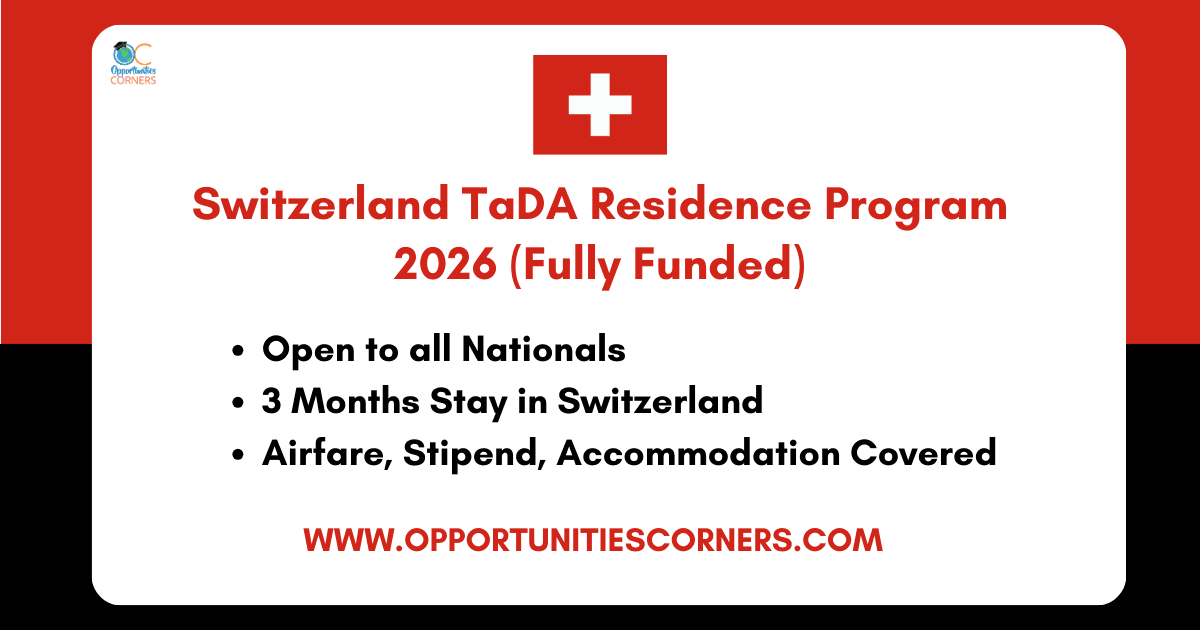Switzerland TaDA Residence Program 2026 (Fully Funded)

Fully Funded TaDA Residence Program in Switzerland Opens Applications for 2026
Applications are now being accepted for the Switzerland TaDA Residence Program 2026, a fully funded, three-month residency designed for international and national applicants working in diverse fields such as art, design, and architecture. The program offers a unique opportunity to collaborate with textile companies in Eastern Switzerland, fostering innovative and experimental ideas related to textiles and design.
Program Overview
The TaDA Residence Program, organized by the Textile and Design Alliance, provides a platform for creatives to engage with and learn from textile companies and institutions in Eastern Switzerland. Participants will contribute to a new project in partnership with a local textile company and present their work publicly through events and workshops. The program offers two sessions: April to June 2026 and September to November 2026.
Host Country: Switzerland Location: Arbon Duration: 3 Months Benefits: Fully Funded Deadline: 15th September 2025
Financial Support and Benefits
The TaDA Residence Program provides comprehensive financial support to its participants, covering essential expenses to ensure a focused and productive residency. The benefits include:
Shared Accommodation Travel to/from Switzerland Living Expense Contribution Joint Workspace
Eligibility Criteria
The program is open to a wide range of applicants with a demonstrable interest in textiles and design. Key eligibility requirements include:
Applicants from all countries are eligible. Individuals working in diverse fields such as art, design, architecture, literature, performing arts, or interdisciplinary contexts are encouraged to apply. Applicants must show a strong interest in the textile industry, textile culture, and sustainability. Good knowledge of English or German is required.
The Historical Context of Textile Arts Residencies
Residency programs focused on textile arts have a rich history, evolving from traditional apprenticeships to contemporary interdisciplinary collaborations. Historically, textile production was deeply embedded in local communities, with skills passed down through generations. Modern residencies like TaDA build upon this legacy, offering a structured environment for artistic exploration and innovation within the context of industrial textile production.
Expert Perspective: The Value of Industry-Academia Partnerships
Dr. Anya Sharma, a professor of Design Studies at the University of Zurich, highlights the importance of programs like TaDA. "These residencies bridge the gap between academic research and industry practice," she explains. "By immersing artists and designers in the realities of textile production, they can develop innovative solutions to contemporary challenges, such as sustainability and ethical sourcing. Moreover, these collaborations often lead to unexpected creative breakthroughs that benefit both the artists and the textile companies."
The Application Process
Interested candidates are required to submit an online application form. The application requires a portfolio showcasing relevant work, a project proposal outlining the intended focus during the residency, and a statement of interest explaining their motivation for participating in the TaDA program.
Analytical Viewpoint: The Impact of Funding on Creative Freedom
Funding plays a crucial role in enabling creative exploration, argues cultural analyst Ben Carter. "Fully funded residencies like TaDA remove the financial barriers that often prevent artists from pursuing experimental projects," he states. "This allows participants to take risks, push boundaries, and ultimately produce work that might not be possible under other circumstances. The investment in these programs is an investment in the future of textile innovation."
Switzerland's Commitment to Arts and Culture
Switzerland has a long-standing tradition of supporting arts and culture through various initiatives and funding programs. The TaDA Residence Program aligns with this commitment, fostering creativity and innovation within the textile industry, a significant part of the Swiss economy. The program not only benefits the participating artists but also contributes to the cultural and economic vibrancy of the region.
Looking Ahead
The TaDA Residence Program 2026 promises to be a valuable experience for artists and designers seeking to explore the intersection of art, design, and textile technology. By providing a fully funded platform for collaboration and innovation, the program aims to drive new developments in the textile industry and foster a deeper appreciation for textile culture.
Interested applicants are encouraged to visit the official program website for complete application details and guidelines. The deadline for applications is September 15th, 2025.
Originally sourced from: Opportunities Corners
